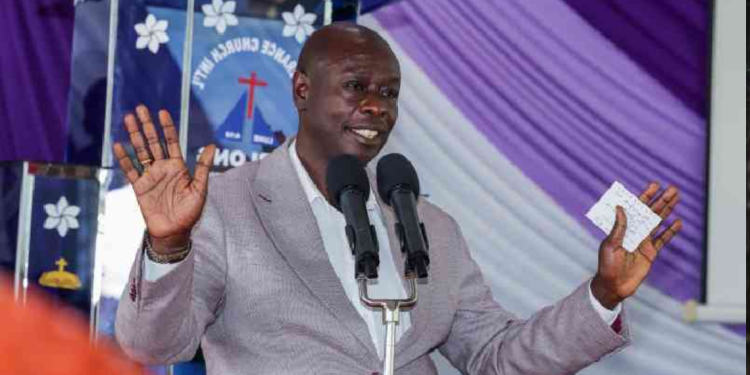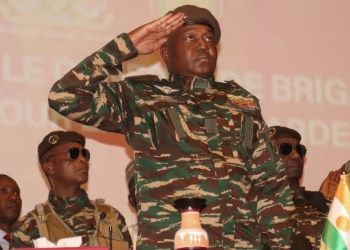A political misstep by impeached Deputy President Rigathi Gachagua has left him in a vulnerable position.
His failure to formalize an agreement with President William Ruto ahead of the 2022 elections stands in stark contrast to the majority of Kenya Kwanza leaders, who secured strong commitments with Ruto’s UDA party to safeguard against arbitrary removal.
Political indicators suggest Gachagua’s predicament may worsen if he is expelled soon, both from his party and his deputy role. UDA Secretary General Hassan Omar stated that Gachagua is set to be removed as deputy party leader once Kithure Kindiki is sworn in as deputy president.
“The NEC will convene to ratify Kindiki as the new deputy party leader,” Omar announced.
Kindiki took his oath of office last Friday after the High Court lifted orders that had prevented him from doing so, following Gachagua’s challenge to his impeachment.
In a moment of apparent reflection, Gachagua advised the Mount Kenya community to remain calm and to speak up only at the appropriate time. “We in the Mount Kenya region prefer not to make noise or protest in the streets; we wait for the right moment to make our voices heard at the ballot box,” he said during a funeral in Limuru, Kiambu County.
While other Kenya Kwanza leaders secured legally binding agreements, Gachagua relied on Ruto’s goodwill during the campaign. Some prominent figures, including Senate Speaker Amason Kingi and National Assembly Speaker Moses Wetang’ula, reportedly played a role in Gachagua’s potential downfall by overseeing his dismissal.
“Gachagua’s discussions with Ruto might have occurred privately before the 2022 elections, but they were never documented,” noted political analyst Mwangi Kinyanjui. “His misplaced trust left him exposed, and he will regret not pushing for a formal negotiation with Ruto before the elections.”
Analysts suggest that Ruto would have likely won the Mt. Kenya region even with another running mate, though some argue that Gachagua’s aggressive campaigning was pivotal in Ruto’s victory over former President Uhuru Kenyatta.
“Let’s not kid ourselves. Without Gachagua, it would have been incredibly challenging to defeat Uhuru in Mt. Kenya. He was crucial to Ruto’s success,” said Embakasi North MP James Gakuya, a close ally of Gachagua.
While Kindiki was seen as the frontrunner for the deputy position, Gachagua was ultimately selected after extensive negotiations at Ruto’s residence. Reports indicate that many MPs from Mt. Kenya preferred Kindiki, but Ruto chose Gachagua instead.
Ruto has admitted that he overruled MPs on his running mate choice due to his confidence in Gachagua. During the 2022 campaign, Gachagua had to reassure his Mount Kenya constituents amid concerns over the absence of a formal agreement with Ruto. “As the Mt. Kenya region, we don’t need to sign anything with Ruto; we trust him,” Gachagua stated at a rally in Nyeri in May 2022.
Now, analysts contend that Gachagua’s trust has backfired, as Ruto’s allies are poised to push him out of UDA, where he serves as deputy party leader. Omar indicated that Gachagua’s removal would be pursued once his court issues are resolved.
The High Court’s ruling allowing Kindiki to be sworn in has left Gachagua politically weakened, even as he seeks to clear his name in court, hoping to run for office again. Legally, impeached officials cannot hold public office, and analysts assert that Gachagua lacks the influence within UDA due to the absence of a binding agreement with Ruto.
“Gachagua is in a precarious position; unlike other Kenya Kwanza leaders, he has no solid pact within UDA to protect him,” remarked political analyst Alexander Nyamboga.
Nyamboga suggested that Gachagua’s downfall arose from his failure to secure an agreement with Ruto before accepting the running mate role. “Had he effectively mobilized support for a deal with Ruto, it would have been much harder to remove him from office and UDA.”
Other significant Kenya Kwanza leaders, unlike Gachagua, have formal agreements with Ruto that include power-sharing terms. Prime Cabinet Secretary Musalia Mudavadi secured his position through an agreement with the ANC party, while Wetang’ula established a pre-election deal with the Kenya Kwanza Alliance via his Ford Kenya party, ensuring his role as National Assembly Speaker.
Their agreements guaranteed their positions and protected them from arbitrary dismissal unless specific exit clauses were invoked. Gachagua, as a founding UDA member, was particularly affected by former President Uhuru’s actions during the campaign, significantly diminishing the Jubilee party’s influence in Mount Kenya.
If expelled from UDA before the 2027 elections, Gachagua could potentially form a new party and collaborate with other like-minded factions, possibly aligning with Wiper leader Kalonzo Musyoka, who has supported him amid the UDA challenges.
There are indications that Gachagua, Musyoka, and Uhuru may unite politically to contest Ruto in 2027, while Ruto’s alliance with former Prime Minister Raila Odinga is perceived as part of his reelection strategy, as he has integrated key Raila allies into his Cabinet.
Recently, Gachagua expressed regret over supporting Ruto without political backing, reflecting on the skepticism surrounding Ruto’s trustworthiness before the elections, noting that he was the only one who relied solely on verbal assurances.















